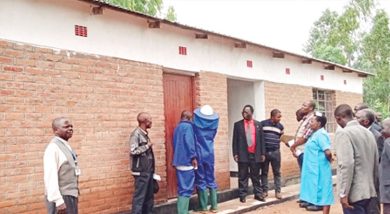THE NATION INTERVIEW WITH CCJP’S COORDINATOR CHRIS CHISONI:
EXCERPTS:
Review of 2011 and prospects for 2012
1.The year 2011 is ending. What are the positives and negatives that the country went through as far as CCJP is concerned. Who is to blame for the mess the country went through? Where do we as a country need to improve on?
In this year gone by, Malawi was at a metamorphosis in its political and economic scenery. It is compellingly challenging to have a blanket answer summarizing what the nation and people of Malawi have gone through. However, with clear examples, we can make a simple and clear statement on this scenery.
We believe, today, many decision makers, both political and economic, can no longer assume that they owe nothing to anyone other than themselves. This is because Malawians have spoken their minds in this whole year. Just in the recent past, we have seen continued efforts by government directly or indirectly to limit citizen participation in governance processes.
Consequently, Malawians had woken up to a reality that was unimaginable since we reverted to multiparty politics in 1993. There has been abnormal use of power by those in leadership positions due to excessive powers conferred to them by our constitution or due to the trendy failure to abide to the rule of law by those in leadership positions.
This is clearly evident in the operations of those in leadership positions that ignore reasonable voices from many non-state stakeholders i.e. faith communities, civil society movement, diplomatic communities and others in seeking to build a better Malawi. It is very clear that those in power and in leadership positions do not respect advice nor do they take constructive criticism for wrong decisions.
The excess power had brought in arrogance that has extended to parliament becoming an offshoot of the executive as every proposed law or amendment (with minor exceptions) has been passed in parliament regardless of the many opposing voices from citizens. This is evident through the national flag amendment bill, the local courts bill, the local government elections bill, the injunctions bill, the amendment of the police act and many others. The nature, the speed and process these bills were introduced and debated in parliament has clearly indicated that the majority that DPP has, has become a rubberstamp with limited analysis and debate from few opposition MPs.
In 2011, the civic culture that has been promoted by the current government leadership has shown that the majority seats DPP has in Parliament is not properly comprehended. It has been assumed, by government, by this status, that none other than government has mandate to speak on behalf of Malawian citizens. No wonder pronouncements like “ who mandated youâ€Â, “who sent or voted for youâ€Â, “you are drunkardsâ€Â, “you are all stupid†have been uttered without remorse by leaders in total contempt of the roles that various stakeholders played and continued to play for socio-economic-political development and the common good of this nation.
Consequently, the faith communities, the civil society groups and many other stakeholders have appeared to have taken a collision path with government whilst the ardent desire for the non state actors has been and continues to be to call for accountable leadership and government that builds confidence in its people as well as that provides services to its citizens.
Due to this, serious down turn of politics and the stagnation of the economy have emerged leading into:
- CSO leaders and faith-based leaders being threaten, beaten by state apparatus due to their stance on governance issues in Malawi.
- Some key bilateral partners of Malawi withholding aid and budget support to Malawi due to this lack of respect for human rights and failure to show commitment on governance processes.
- Malawi economy, despite its steady growth in the recent past, has been grounded with acute shortage of forex and fuel leading to shortages in essential drugs in hospitals and increasing the prices of commodities on the market making the poor to pay more from a weak pocket.
- Public anger increasing in the process that led to the July 20 demonstrations across the nation unfortunately leading to the killing of [20] people as well as to the loss of private property through burning and looting.
- Despite many efforts towards dialogue for better governance, it is becoming apparent that the governance processes are not coming sooner to stability and calmness. This is more so when opposition parties have many internal problems to provide meaningful avenues for better governance while DPP is seemingly entrenching leadership of intimidation and violence upon its critics.
Furthermore, in 2011, the only important positive story arising from Malawi in this year gone is about the emerging dialogue for peace which includes dialogue with Malawi’s development partners, with financial institutions, with local stakeholders. If done with at most honesty, probably Malawi can get back on its feet. It is also important to take note of the fact that Malawi government has dedicated civil servants (technocrats) who have kept their heads up high to deliver government programs, those that benefit the majority poor. Furthermore, those government led development programs funded by cooperating partners have continued regardless of the many challenges the country is facing. The case in point being the farm inputs subsidy program.
2. What is your assessment of NGOs role in the 2011 in terms of holding
government accountable? Was their continued criticism of government
justified or was politically motivated? Do you feel they were
supported by some donors to pressure government? How best should the NGOs
work with government in the New Year?
The CSOs/NGOs have done commendable job in this year gone by. You know there a lot of NGOs that are assisting in delivery of social services like water, education, agriculture and many others. These have not abandoned their noble causes. The CSOs/ NGOs that are dealing with governance issues are the ones that have been prominent in this year. It is due to the nature of their work, I suppose. In raising the challenges Malawians have been facing, CSOs and many other stakeholders do not necessarily choose to be antagonistic with government. Oftentimes government has labeled CSOs as sell-outs, those that choose to be noisy because they want to profile themselves so that they attract funding from donors.
This in essence is just mere political propaganda. No CSO/NGO of its salt will choose to get money by telling lies. What is critical is government to accept criticism where there is clear evidence of the state predating on its very citizens. It is the reason why some CSOs will call themselves watchdogs or voice of the voiceless because the majority of Malawian citizens are yet to find a plat form of expressing themselves.
With this in mind, we need to part on the back of CSOs as they have been on the spot. This, on the other hand overstretched the mandate of CSOs in Malawi as they stepped in the shoes of opposition parties who are currently beleaguered in internal strife and have no effective numerical strength in parliament.
As we look into 2012, it is crucial for CSOs and government to work as partners towards building a better Malawi where common good inspires all of us. We all must work to make sure that men and women in the variety of their origins, cultures, languages and religions not overlooking political parties and tribes, are capable of living together in harmony.
It will be important for the betterment of Malawi, to develop the ability amidst all stakeholders(government, political parties, faith communities, CSOs, development partners etc) to recognize all the positives in the other so as to welcome them and prize them as gifts that God gives us through other people. We must also resist the selfish temptations which constantly beset us and provoke competition, careerism, distrust and jealousy.
3. In the new year, what do you call from the President, politicians,
MPs, government, NGOs and other stakeholders?
Without being particular in the formula towards getting solutions for the problems Malawi is facing currently, we need primarily to make a humble confession. This is to say that the difficulties encountered by the country are not so much insurmountable obstacles but challenges. These are challenging our imagination, our intelligence and our vocation to seek for solutions. It is an imperative for all of us, that instead of antagonism, proactively we, all sectors together, come forward to respond to these challenges.
We do acknowledge that men and women are shaped by their past. In this case, we are shaped by what we have gone through in 2010 to 2011. However, we live and journey into the present and look ahead to 2012. Like the rest of the world grappling with crises of sorts of kinds, in the present crisis Malawi is facing, paths of hope will be discovered fostering dialogue among members of Malawi’s constituents of religious, social, economic and political communities




